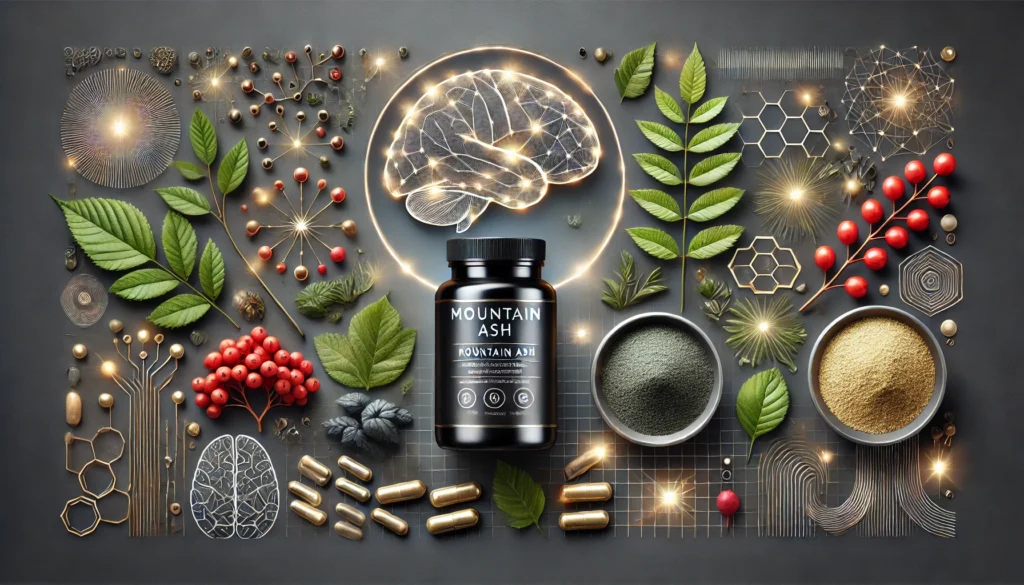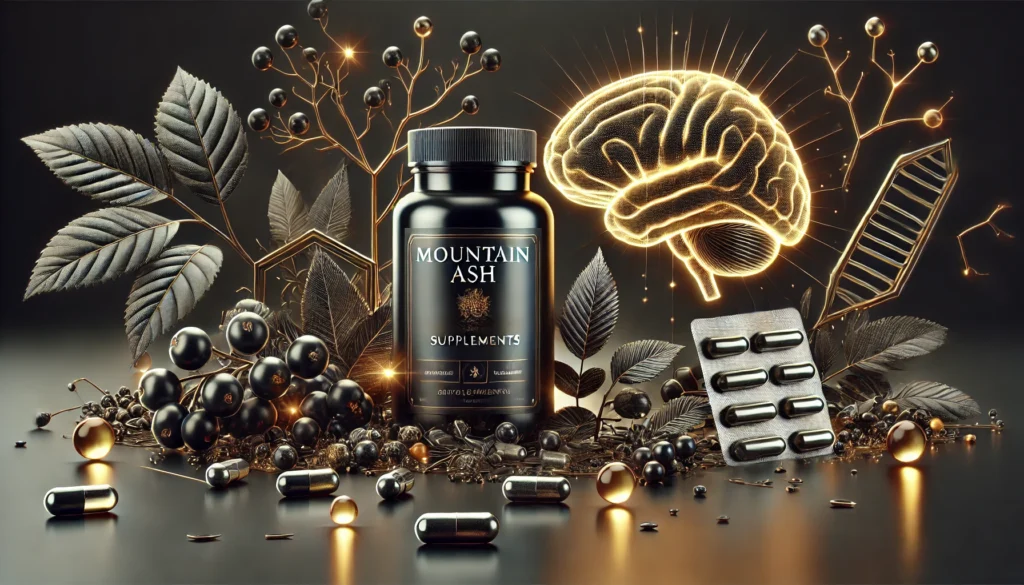Mountain Ash (Sorbus aucuparia) is a deciduous tree native to Europe and parts of Asia, renowned for its clusters of bright red berries and its adaptability to various climates. In traditional herbal medicine, Mountain Ash has been valued for its medicinal properties, particularly in treating ailments related to the digestive and respiratory systems. More recently, there has been growing interest in its potential as a nootropic supplement due to its biochemical properties and effects on cognitive function. This article explores the chemistry, physiological mechanisms, and nootropic benefits of Mountain Ash, while also providing a detailed look at its dosage, safety considerations, and potential interactions with other supplements and medications.
Sources of Mountain Ash
Mountain Ash, also known as rowan, is widely distributed across temperate regions of Europe and parts of North America and Asia. The tree typically grows in forests, hills, and woodlands, and is characterized by its bright red or orange berries, which ripen in late summer and fall. Historically, the berries and other parts of the plant were used by indigenous peoples and in European folk medicine, particularly for their astringent, anti-inflammatory, and antioxidant properties. The berries are rich in phenolic compounds, flavonoids, and vitamins, all of which contribute to their therapeutic potential.
While the berries of the Mountain Ash are most commonly used for their medicinal benefits, the leaves, bark, and flowers have also been employed in various herbal preparations. In recent years, the fruit has attracted attention for its potential as a natural supplement with cognitive-enhancing effects, especially in terms of its antioxidant activity and its ability to support overall brain health.

Chemistry of Mountain Ash
The pharmacological properties of Mountain Ash, particularly its potential as a nootropic, can be largely attributed to the presence of bioactive compounds, including flavonoids, phenolic acids, and triterpenes. These compounds not only contribute to the plant’s antioxidant, anti-inflammatory, and anti-microbial effects but also may play a role in enhancing cognitive function.
Flavonoids
Flavonoids are a diverse group of polyphenolic compounds found in many fruits, vegetables, and plants. In Mountain Ash, flavonoids such as quercetin, kaempferol, and rutin are present in significant quantities. These compounds are known for their antioxidant properties, which help protect cells from oxidative stress by scavenging reactive oxygen species (ROS). In the brain, oxidative stress is a major contributor to neurodegeneration and cognitive decline, particularly in age-related diseases such as Alzheimer’s and Parkinson’s disease.
Flavonoids also support cognitive function by enhancing blood flow to the brain and improving microvascular health. By promoting healthy circulation, they facilitate the delivery of oxygen and nutrients to neurons, which is essential for optimal brain function. The neuroprotective effects of flavonoids in Mountain Ash may be beneficial for individuals seeking to improve mental clarity, reduce mental fatigue, and protect against long-term cognitive decline.
Phenolic Acids
Phenolic acids, such as chlorogenic acid, are another key group of bioactive compounds found in Mountain Ash. These acids are potent antioxidants that contribute to the plant’s ability to neutralize free radicals and protect cells from oxidative damage. In addition to their antioxidant activity, phenolic acids also have anti-inflammatory effects, which can help reduce neuroinflammation, a condition associated with various neurological disorders.
Chlorogenic acid, in particular, has been studied for its ability to improve memory and learning by modulating the brain’s cholinergic system. The cholinergic system is involved in memory consolidation, learning, and attention. By enhancing the activity of acetylcholine, a neurotransmitter critical for cognitive function, chlorogenic acid may support improved memory and focus, making it a potential ally for cognitive enhancement.
Triterpenes
Triterpenes are another important class of compounds in Mountain Ash that have been shown to have anti-inflammatory, anti-anxiety, and neuroprotective effects. These compounds interact with various receptors in the central nervous system (CNS), influencing neurochemicals such as GABA (gamma-aminobutyric acid) and serotonin. The modulation of these neurotransmitters can lead to reduced anxiety, enhanced mood, and an overall sense of calm, which may improve cognitive performance by creating a more stable mental environment.

Physiological Mechanisms of Action
The cognitive-enhancing effects of Mountain Ash can be attributed to several key physiological mechanisms. These include its antioxidant activity, its ability to improve cerebral circulation, and its potential to modulate neurotransmitter systems involved in memory, mood, and cognitive performance.
- Antioxidant and Neuroprotective Effects: The flavonoids and phenolic acids in Mountain Ash play a significant role in protecting the brain from oxidative stress. Oxidative stress occurs when there is an imbalance between free radicals and antioxidants, leading to cellular damage and contributing to neurodegenerative diseases. By neutralizing free radicals, these compounds help protect neurons from damage, which may slow the progression of cognitive decline and support long-term brain health.
- Improved Blood Flow to the Brain: Flavonoids, such as quercetin and rutin, have been shown to improve endothelial function and increase blood flow to the brain. Better cerebral circulation facilitates the delivery of oxygen and essential nutrients to brain cells, which is particularly important for sustaining cognitive function, especially under conditions of mental fatigue. Enhanced circulation also helps clear metabolic waste products from the brain, reducing the risk of neurodegenerative conditions.
- Modulation of Neurotransmitters: Some of the active compounds in Mountain Ash, such as chlorogenic acid, may modulate the activity of neurotransmitters involved in memory, learning, and mood regulation. For example, the enhancement of acetylcholine activity in the brain may improve memory and learning capacity. Additionally, the plant’s triterpenes may interact with GABA and serotonin receptors, promoting a calming effect and reducing anxiety, which can create a more conducive environment for cognitive function.
- Anti-inflammatory Effects: Chronic inflammation in the brain has been implicated in the development of various cognitive disorders, including Alzheimer’s disease. The anti-inflammatory compounds in Mountain Ash, particularly the phenolic acids, help reduce neuroinflammation and support brain health. By decreasing inflammation, Mountain Ash may help mitigate the cognitive impairment that results from prolonged inflammatory processes in the brain.

Potential Nootropic Benefits of Mountain Ash
Based on its biochemical properties and mechanisms of action, Mountain Ash shows promise as a nootropic supplement with the following potential cognitive benefits:
- Improved Memory and Learning: The flavonoids and phenolic acids in Mountain Ash, particularly quercetin and chlorogenic acid, have been linked to enhanced memory and learning. By improving blood flow to the brain, increasing acetylcholine activity, and providing antioxidant protection, Mountain Ash may support memory consolidation and facilitate the learning process, making it a useful supplement for individuals looking to enhance cognitive performance.
- Increased Mental Clarity and Focus: Mountain Ash’s ability to improve circulation and reduce oxidative stress may help boost mental clarity and focus. These effects can be particularly beneficial for individuals experiencing cognitive fatigue or working in high-demand environments where sustained concentration is necessary.
- Mood Enhancement and Anxiety Reduction: The triterpenes in Mountain Ash, which modulate GABA and serotonin receptors, may promote a sense of calm and reduce anxiety. This calming effect can help individuals maintain mental stability and prevent stress-related cognitive decline. By fostering a positive mood and reducing anxiety, Mountain Ash may also support enhanced cognitive function.
- Neuroprotective Effects and Long-Term Brain Health: The antioxidant and anti-inflammatory properties of Mountain Ash may help protect against age-related cognitive decline and neurodegenerative diseases. By reducing oxidative stress and inflammation, Mountain Ash could play a role in preserving brain health and delaying the onset of conditions such as Alzheimer’s disease and Parkinson’s disease.

Dosage and Supplementation Guidelines
The appropriate dosage of Mountain Ash as a nootropic supplement can vary depending on the individual’s health status and goals. However, some general guidelines can be provided based on available research and traditional uses.
- Standard Dosage: The recommended dosage for Mountain Ash extract typically ranges from 500 mg to 1,000 mg per day, divided into two doses. It is important to start with a lower dose to assess tolerance and gradually increase if necessary.
- Capsules and Tablets: Mountain Ash supplements are available in various forms, including capsules, tablets, and tinctures. Standardized extracts may contain concentrations of 5-10% flavonoids or phenolic acids. A typical dose for cognitive enhancement is around 500 mg of standardized extract per day.
- Herbal Tea: Mountain Ash can also be consumed as an herbal tea, with 1-2 teaspoons of dried berries steeped in hot water for 10-15 minutes. This method of consumption is often used for general health and well-being, though it may not offer the same concentrated effects as standardized extracts.
Side Effects and Risks
Mountain Ash is generally considered safe when used as directed, though there are some potential side effects and considerations to keep in mind:
- Gastrointestinal Disturbances: Some individuals may experience mild gastrointestinal discomfort, such as nausea or an upset stomach, particularly when taking large doses of Mountain Ash extract.
- Allergic Reactions: Although rare, allergic reactions to Mountain Ash may occur, especially in individuals who are sensitive to other plants in the Rosaceae family (such as apples, cherries, and peaches).
- Blood Pressure: Mountain Ash may have mild hypotensive effects, potentially lowering blood pressure. Individuals with low blood pressure or those on antihypertensive medications should consult a healthcare provider before using Mountain Ash supplements.
Ashwagandha promotes mental clarity and reduces brain fog—Optimize Your Mind, Order Now on Amazon!

Interactions with Other Supplements and Medications
Mountain Ash may interact with certain medications and supplements, which could alter its effectiveness or lead to potential side effects:
- Antidepressants and Anti-anxiety medications: Because Mountain Ash can affect serotonin and GABA levels, it may interact with medications that influence these neurotransmitters, such as antidepressants and anti-anxiety medications. Caution is advised when combining Mountain Ash with these drugs.
- Blood Pressure Medications: Due to its potential to lower blood pressure, Mountain Ash should be used with caution in individuals taking antihypertensive medications.
- Blood Thinners: Mountain Ash may have mild anticoagulant properties, so individuals taking blood-thinning medications (e.g., warfarin or aspirin) should consult a healthcare provider before using Mountain Ash supplements.
Risks for Individuals with Certain Health Conditions
While Mountain Ash is generally safe for most individuals, certain health conditions may warrant caution when using this supplement. Here are three key considerations:
- Hypotension (Low Blood Pressure): Mountain Ash may have mild hypotensive effects, potentially lowering blood pressure further in individuals with existing low blood pressure. Those on antihypertensive medications should consult a healthcare provider before using this supplement.
- Bleeding Disorders: Due to its mild anticoagulant properties, Mountain Ash could increase the risk of bleeding in individuals with bleeding disorders or those taking blood-thinning medications like warfarin. Caution is advised when using Mountain Ash alongside these treatments.
- Pregnancy and Breastfeeding: Limited research exists on the safety of Mountain Ash during pregnancy and breastfeeding. To err on the side of caution, pregnant or breastfeeding women should consult a healthcare provider before using this supplement.
As always, individuals with these or other health concerns should seek professional medical advice before incorporating Mountain Ash into their routine.
Conclusion: Should You Consider Mountain Ash as a Nootropic?
Mountain Ash presents a promising natural supplement for cognitive enhancement due to its antioxidant, anti-inflammatory, and neuroprotective properties. By improving cerebral circulation, protecting against oxidative damage, and modulating neurotransmitter systems, it may offer a range of benefits, including improved memory, focus, and mood. However, more research is needed to fully understand the extent of its nootropic potential and to determine optimal dosing and long-term safety. As with any supplement, individuals should consult a healthcare provider before beginning Mountain Ash supplementation, especially if they have existing health conditions or are taking medications that may interact with the plant’s active compounds.
In summary, Mountain Ash is a versatile and potent herbal supplement with potential cognitive-enhancing benefits. It may be worth considering for those seeking to support brain health, improve mental clarity, and protect against age-related cognitive decline.

References:
- Mountain Ash: Health Benefits, Side Effects, Uses, Dose & Precautions. Retrieved from:https://www.rxlist.com/supplements/mountain_ash.htm
- Mountain Ash – Uses, Side Effects, and More. Retrieved from: https://www.webmd.com/vitamins/ai/ingredientmono-571/mountain-ash
- Effect of Chlorogenic Acids on Cognitive Function: A Randomized, Double-Blind, Placebo-Controlled Trial. Retrieved from: https://pmc.ncbi.nlm.nih.gov/articles/PMC6213760/
- Effect of Chlorogenic Acid Intake on Cognitive Function in the Elderly: A Pilot Study. Retrieved from: https://onlinelibrary.wiley.com/doi/10.1155/2018/8608497
- A Triterpenoid Lupeol as an Antioxidant and Anti-Neuroinflammatory Agent: Impacts on Oxidative Stress in Alzheimer’s Disease. Retrieved from: https://pubmed.ncbi.nlm.nih.gov/37447385/
Important Note: The information contained in this article is for general informational purposes only, and should not be construed as health or medical advice, nor is it intended to diagnose, prevent, treat, or cure any disease or health condition. Before embarking on any diet, fitness regimen, or program of nutritional supplementation, it is advisable to consult your healthcare professional in order to determine its safety and probable efficacy in terms of your individual state of health.
Regarding Nutritional Supplements Or Other Non-Prescription Health Products: If any nutritional supplements or other non-prescription health products are mentioned in the foregoing article, any claims or statements made about them have not been evaluated by the U.S. Food and Drug Administration, and such nutritional supplements or other health products are not intended to diagnose, treat, cure, or prevent any disease.


